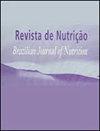Association between glycemic control in different emotional conditions and adherence to carbohydrate counting in people with type 1 diabetes during the COVID-19 pandemic in Brazil
IF 0.5
4区 医学
Q4 NUTRITION & DIETETICS
Revista De Nutricao-brazilian Journal of Nutrition
Pub Date : 2023-09-04
DOI:10.1590/1678-9865202336e220247
引用次数: 0
Abstract
ABSTRACT Objective Evaluate the association between glycemic control in different emotional perceptions and the adherence to carbohydrate counting by adults with type 1 diabetes during the COVID-19 pandemic in Brazil. Methods This cross-sectional, descriptive, and analytical study was approved by the Research Ethics Committee (Opinion nº 4,147,663) and conducted in July 2020 using a Google Forms® form. Socioeconomic and demographic data were collected; glycemic monitoring according to the individuals’ emotions at the time of measurement (happy, motivated, or hopeful; stressed or anxious; sad, distressed, or with depressive symptoms); data on adherence to carbohydrate counting and social distancing. Pearson’s Chi-Square test was applied with adjusted residual analysis (p<0.05). Results Approximately 64.62% of the 472 participants, had hyperglycemia when stressed/anxious, and 52.97% when they felt sad/distressed/depressive (p<0.000). Associations were observed between having normoglycemia in any emotional situation and performing the carbohydrate counting (p<0.000); perceiving oneself as happy/motivated/hopeful and having hyperglycemia, and not measuring blood glucose was associated with not having the carbohydrate counting (p<0.000); being stressed or anxious was associated with not measuring blood glucose and not having the carbohydrate counting (p<0.000). Conclusion The need for multidisciplinary care to enhance mental health and adherence to treatment for people with type 1 diabetes is highlighted.在巴西COVID-19大流行期间,不同情绪状态下的血糖控制与1型糖尿病患者坚持碳水化合物计数之间的关系
【摘要】目的评估巴西2019冠状病毒病大流行期间,不同情绪感知下的血糖控制与1型糖尿病成人坚持碳水化合物计数之间的关系。这项横断面、描述性和分析性研究获得了研究伦理委员会(意见nº4147663)的批准,并于2020年7月使用谷歌Forms®表格进行。收集了社会经济和人口统计数据;根据测量时的个人情绪进行血糖监测(快乐、积极或充满希望;紧张的或焦虑的;悲伤、痛苦或有抑郁症状);坚持碳水化合物计数和保持社交距离的数据。采用Pearson卡方检验,校正残差分析(p<0.05)。结果472名参与者中,约64.62%的人在压力/焦虑时出现高血糖,52.97%的人在感到悲伤/痛苦/抑郁时出现高血糖(p<0.000)。观察到在任何情绪情况下血糖正常与进行碳水化合物计数之间存在关联(p<0.000);认为自己快乐/有动力/有希望且有高血糖,不测量血糖与不进行碳水化合物计数相关(p<0.000);压力或焦虑与不测量血糖和不进行碳水化合物计数有关(p<0.000)。结论1型糖尿病患者需要多学科护理以提高心理健康水平和治疗依从性。
本文章由计算机程序翻译,如有差异,请以英文原文为准。
求助全文
约1分钟内获得全文
求助全文
来源期刊
CiteScore
1.20
自引率
12.50%
发文量
24
审稿时长
6-12 weeks
期刊介绍:
Revista de Nutrição is former Revista de Nutrição da Puccamp, founded in 1988. It is a bimonthly publication every four months and it is of responsibility of the Centro de Ciências da Vida, da Pontifícia Universidade Católica de Campinas . It publishes articles that contribute to the study of Nutrition in its many sub-areas and interfaces; and is open to contributions of the national and international scientific communities.

 求助内容:
求助内容: 应助结果提醒方式:
应助结果提醒方式:


